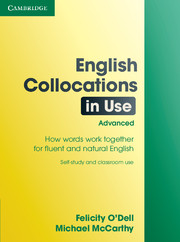English Collocations In Use

Author: Michael McCarthy; Felicity Odell
Publisher: Cambridge University Press
A good knowledge of collocations (typical word combinations) is essential for fluent and natural-sounding English. Using collocations will improve your style of written and spoken English, and knowledge of collocations is often tested in examinations such as Cambridge FCE, CAE, CPE and IELTS. Learning correct word combinations will also help you avoid common learner errors.
English Collocations in Use presents and practises hundreds of collocations in typical contexts. It is ideal for students at good intermediate level and above. Using collocations will improve your style of written and spoken English: instead of 'a big amount', say 'a substantial amount'; and instead of 'think about the options', say 'consider the options'. Using collocations will make your English sound more natural: instead of 'get ill', say 'fall ill'; and instead of 'a big fine', say 'a heavy fine'. Using collocations will help you avoid common learner errors: instead of 'do a choice', say 'make a choice'; and instead of 'make your homework', say 'do your homework'.
CONTENTS:
Learning about collocations: 1 What is a collocation?; 2 Finding, recording and learning collocations; 3 Using your dictionary; 4 Types of collocation; 5 Register; Grammatical aspects of collocations: 6 Intensifying and quantifying adverbs; 7 Everyday verbs 1; 8 Everyday verbs 2; 9 Everyday verbs 3; Special aspects of collocation: 10 Synonyms and confusable words 1; 11 Synonyms and confusable words 2; 12 Metaphor; Topics: Travel and the environment: 13 Weather; 14 Travel; 15 Countryside; 16 Towns; Topics: People and relationships: 17 People ї character;18 People - physical appearance; 19 Family; 20 Relationships; 21 Feelings and mental states; Topics: Leisure and lifestyle: 22 Houses; 23 Eating and drinking; 24 Films and books; 25 Music; 26 Sport; 27 Health and illness; Topics: Work and study: 28 Computers and technology; 29 Study and learning; 30 Work; 31 Business; 32 Academic writing 1; 33 Academic writing 2; Topics: Society and institutions: 34 Laws and punishments; 35 Crime; 36 News; 37 Money; 38 War and peace; 39 Global problems; Basic concepts: 40 Time; 41 Sound; 42 Distance and size; 43 Light and brightness; 44 Texture; 45 Taste and smell; 46 Number and quantity; 47 Movement and speed; 48 Change; 49 Ways of speaking; 50 Ways of walking; Functions: 51 Starting and finishing; 52 Talking about success and failure; 53 Talking about cause and effect; 54 Remembering and sensing; 55 Agreeing and disagreeing; 56 Talking about beliefs and opinions; 57 Deciding and choosing; 58 Claiming and denying; 59 Liking and disliking; 60 Praising and criticising; Answer key; Index
DOWNLOAD
---original version (61 MB, PDF)
http://rapidshare.com/files/88611404/English_Collocations_In_Use.pdf
or
http://ifile.it/z42grou
or
http://www.zshare.net/download/12527260dae3311f/
---size reduced version (PDF in RAR 3.20, 5.2 MB) by Pumukl
http://rapidshare.com/files/173026444/eciu-bl.rar
CONTENTS:
Learning about collocations: 1 What is a collocation?; 2 Finding, recording and learning collocations; 3 Using your dictionary; 4 Types of collocation; 5 Register; Grammatical aspects of collocations: 6 Intensifying and quantifying adverbs; 7 Everyday verbs 1; 8 Everyday verbs 2; 9 Everyday verbs 3; Special aspects of collocation: 10 Synonyms and confusable words 1; 11 Synonyms and confusable words 2; 12 Metaphor; Topics: Travel and the environment: 13 Weather; 14 Travel; 15 Countryside; 16 Towns; Topics: People and relationships: 17 People ї character;18 People - physical appearance; 19 Family; 20 Relationships; 21 Feelings and mental states; Topics: Leisure and lifestyle: 22 Houses; 23 Eating and drinking; 24 Films and books; 25 Music; 26 Sport; 27 Health and illness; Topics: Work and study: 28 Computers and technology; 29 Study and learning; 30 Work; 31 Business; 32 Academic writing 1; 33 Academic writing 2; Topics: Society and institutions: 34 Laws and punishments; 35 Crime; 36 News; 37 Money; 38 War and peace; 39 Global problems; Basic concepts: 40 Time; 41 Sound; 42 Distance and size; 43 Light and brightness; 44 Texture; 45 Taste and smell; 46 Number and quantity; 47 Movement and speed; 48 Change; 49 Ways of speaking; 50 Ways of walking; Functions: 51 Starting and finishing; 52 Talking about success and failure; 53 Talking about cause and effect; 54 Remembering and sensing; 55 Agreeing and disagreeing; 56 Talking about beliefs and opinions; 57 Deciding and choosing; 58 Claiming and denying; 59 Liking and disliking; 60 Praising and criticising; Answer key; Index
DOWNLOAD
---original version (61 MB, PDF)
http://rapidshare.com/files/88611404/English_Collocations_In_Use.pdf
or
http://ifile.it/z42grou
or
http://www.zshare.net/download/12527260dae3311f/
---size reduced version (PDF in RAR 3.20, 5.2 MB) by Pumukl
http://rapidshare.com/files/173026444/eciu-bl.rar
or
or






